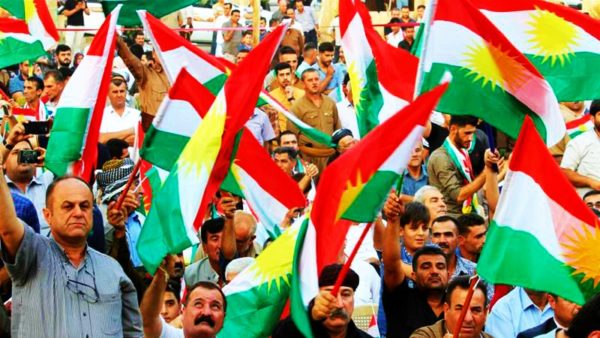
Image credit: Ako Rasheed/Reuters
Today, there are an estimated 24-27 million Kurds living in the Middle East, including a large presence in Turkey, Iraq, Syria and Iran.[1] This makes them the fourth largest ethnic group in the region, yet they do not have their own permanent nation state. On September 25, 2017, Northern Iraq held a referendum vote, proposing a split from Baghdad and the establishment of Kurdish sovereignty within the territory of Iraq. Out of the 8.4 million inhabitants in the area, an overwhelming majority voted in favor of Kurdish independence.
As an American citizen, one may question the relevance of this particular issue – why should we care about the Kurds and their struggle, as miles of ocean and land would separate a so-called “Iraqi-Kurdistan” from our own homeland? The fact is that the Kurds have been invaluable allies of the West, playing a pivotal role in the fight against the Islamic state, as well the usurpation of Saddam Hussein’s brutal dictatorship. As a result, from a foreign policy lens, it is imperative that the U.S. maintains positive relations with the Kurds, as they will continue to be instrumental in achieving our own policy objectives in the region – namely eliminating the threat of ISIS.
From the U.S.’ perspective, this is where the political vendetta lies with this particular issue. While some U.S. policymakers assert that the U.S. is obligated to support the Kurds’ push for independence due to the group’s history of loyalty, others claim that the U.S. should refrain from involvement in the domestic affairs of other countries. These opposing arguments create two different political camps – isolationists vs. interventionists (for the sake of this issue, isolationism is defined as: failing to support Kurdish independence, so that the U.S. does not risk severing ties with the state governments in region). More specifically, a policy supporting the Kurds directly conflicts with Trump’s “America First” agenda, which primarily focuses on U.S.’ interests and national security. In the context of foreign relations, this means that the Trump administration will refrain from involvement in any foreign dispute if it determines that the U.S. will not be able to advance its own status at the global stage. Ultimately, the complexity of this issue is rooted in the fact that U.S. allies are divided over this issue; therefore, the Trump administration must ultimately prioritize the importance of its relationship with each of the involved disputants – the Kurds or the state governments – and determine which side can better advance its own interests in the region.
Throughout the 20th century, U.S. policy towards the Kurds has varied, oscillating between support and ambivalence. In the 1970s, the U.S. supported Kurdish guerilla factions in an effort to overthrow Iraq’s Ba’ath party; however, shortly after, it broke off all relations, which ultimately led to Saddam’s oppressive campaign against its Kurdish population.[2] In more recent years, it appears as though U.S. Kurdish-relations have been revived due to the emergence of the Islamic State in the Middle East. The U.S.’ backing of certain Kurdish insurgent forces, notably the People’s Protection Units (YPG), reflects its increasingly positive relationship with the Kurdish population. For example, during the battle for Kobani, the US-led anti-ISIS coalition worked closely with the YPG to direct airstrikes, as well as providing arms to YPG combatants.[3]
As a result of this alliance, this has led to serious strains between Washington and Ankara because “Ankara’s real fear is that the PYD (the political branch of the YPG) success in Syria will dangerously strengthen the fight against Turkey.”[4] Furthermore, when President Erdoğan visited Washington in the summer of 2017, his private bodyguards viciously beat a group of peaceful pro-Kurdish protesters. As a result of the incident, local police issued warrants to 12 members of Erdoğan’s security team, which has only intensified the tension that exists between the U.S. and Turkey.[5]
In light of the outcome of the recent referendum in Iraq, the Trump administration will be forced to enact some sort of policy related to the Kurdish issue. The options are as follows:
- Support Kurdish independence by intervention (this is not really practical given the high costs associated with the deployment of troops).
- Facilitate multilateral negotiations between the actors – the involved actors (the Kurds and the Iraqi government), as well as external players (NATO and the UN).
- Condemn the referendum and fail to recognize the vote as legitimate.
While there is no easy solution to the Kurdish issue, from the perspective of U.S. policymakers, the opportunity cost of choosing one of these options over another presents considerably greater risks. Those individuals that support some level of intervention on behalf of the Kurds base their arguments on a history of Kurdish loyalty – also, they claim that support for Kurdish independence is consistent with American values, as the Kurds are the most religiously tolerant, pro-Western and anti-jihadist community in the region.[6] However, even though U.S. endorsement of Kurdish independence seems to be the most “morally sound” option, policymakers must consider the potential costs that would come with such an action. For one, any sort of intervention involving military engagement would be economically costly. Furthermore, this level of involvement in the dispute would likely disrupt relations with the state governments in the region, namely Turkey, which has been entangled in an intense civil war with its Kurdish population for the past three decades. U.S. support for the Kurds in Iraq would certainly elicit a negative reaction from Turkey, a country that has been a NATO member since 1952 and an important ally of the U.S.
A statement made by President Bush in a 1991 news conference with Turkish President Özal highlights the strategic importance of Turkey: “We value Turkey’s NATO partnership, its commitment to democracy, and its integral position in the Western community. And Turkey played a critical role, as we all know, in the international coalition that liberated Kuwait, valiantly serving our common interests in a lawful international order and a stable region.”[7]
Based on the calculated risks of choosing to side with one of the disputants over the other – either the Kurds or the Iraqi government – it appears as though there is clearly a best policy decision. While the Kurds have played important roles in several U.S.-led missions in the Middle East, the U.S. cannot sacrifice its relationship with Turkey. Even though the current AKP government under Erdoğan’s guidance has arguably “de-westernized” the state of Turkey, including the implementation of several anti-democratic policies, the U.S. relies on Turkey to maintain order in the transatlantic alliance that is NATO, as well as overall security in Europe.[8] The strategic relevance of Turkey will continue to persist even after the threat of ISIS becomes obsolete. The most ideal scenario would be to facilitate a dialogue between the involved actors, so that the U.S. does not lose the Kurds and Turkey as an ally. However, given the turbulent history between the two groups, a compromise is idealistic at best. Therefore, the U.S. should not legitimize Kurdish independence from a purely strategic standpoint, as such an action would only further destabilize the region and disrupt relations with the more important ally, Turkey.
Take Action:
To learn more about the Kurdish issue and the ongoing conflict in the region, including testimonies from people directly affected by the internal strife in Iraq, Turkey and Syria, visit:
https://thekurdishproject.org/.
To voice your opinion on the issue and become part of the larger Kurdish independence movement, sign the petition at: https://www.change.org/p/united-nations-and-european-union-support-kurdistan-krg-independence
References:
[1]McDowall, A modern history, 3.
[2] https://thekurdishproject.org/kurdistan-news/us-kurdish-relations/
[3]Ibid.
[4]Ishaan Tharoor, “As Syria Burns, Turkey’s Kurdish Problem Is Getting Worse,” The Washington Post, accessed April 5, 2017, https://www.washingtonpost.com/news/worldviews/wp/2016/02/03/as-syria-burns-turkeys-kurdish-problem-is-getting-worse/?utm_term=.13cbcea23726.
[5] https://www.theguardian.com/world/2017/jun/15/turkey-security-officials-washington-dc-protests-arrests
[6] https://www.forbes.com/sites/realspin/2017/09/27/why-the-u-s-should-support-kurdish-independence/#711c1f723a08
[7]“The American Presidency Project,” The American Presidency Project, accessed December 08, 2016, http://www.presidency.ucsb.edu/.
[8]https://www.theatlantic.com/international/archive/2017/08/james-mattis-turkey-erdogan-akp-isis-syria-kurds/537540/




